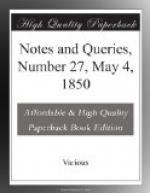I cannot agree with your able corespondent “C.B.” (No. 20. p. 324., and No. 17. p. 262.), that Ezzelin in “Lara” is Seyd of the “Corsair.” My interpretation of both tales is as follows:—Lara and Ezzelin both lived in youth where they afterwards met, viz. in a midland county of England—time about the fourteenth century. Ezzelin was a kinsman, or, more probably, a lover of Medora, whom Lara induced to fly with him, and who shared his corsair life. When Lara had returned home, the midnight scene in the gallery arose from some Frankenstein creation of his own bad conscience; a “horrible shadow,” an “unreal mockery.” Kaled was Gulnare disguised as a page; and when Lara met Ezzelin at Otho’s house, Ezzelin’s indignation arose from his recollection of Medora’s abduction. Otho favours Ezzelin in this quarrel; and, when Kaled looks down upon the “sudden strife,” and becomes deeply moved, her agitation was from seeing in Ezzelin the champion of Medora, her own rival in the affections of Lara. Ezzelin is murdered, probably by the contrivance of Kaled, who had before shown that she could lend a hand in such an affair. After this, Lara collects a band, like what David gathered to himself in the cave of Adullam, and what follows suits the mediaeval period of English history.
I will briefly quote in support of this view. Otho shows that Lara and Ezzelin had both sprung from one spot, when he says,
“I pledge myself for thee, as not
unknown,
Though like Count Lara now return’d
alone
From other lands, almost a stranger
grown.”
The 9th section of canto 1. is a description of Byron himself at Newstead (the two poems are merely vehicles of their authors’ own feelings), with the celebrated skull, since made into a drinking cup, beside him. The succeeding section is a picture {444} of “our own dear lake.” That Medora was a gentlewoman, and not from the slave-market, is shown by Conrad’s appreciation of her in the 12th section of the first canto of the “Corsair;” and why not formerly beloved by Ezzelin, and thus alluded to by him in the quarrel scene?
“And deem’st thou me unknown
too? Gaze again!
At least thy memory was not given
in vain,
Oh! never canst thou cancel half
her debt,
Eternity forbids thee to forget.”
The accents, muttered in a foreign tongue by Lara, on recovering from his swoon in the gallery,—
“And
meant to meet an ear
That hears him not—alas! that
cannot hear”—
were addressed, I think, to Medora; and I am only the more disposed to this opinion by their effect on Kaled. (See canto 1. sec. 14.)
I quite agree with “EMDEE” in esteeming “Lara” a magnificent poem.
A.G.
Ecclesfield, March 18, 1850.
* * * * *
REPLIES TO MINOR QUERIES.




